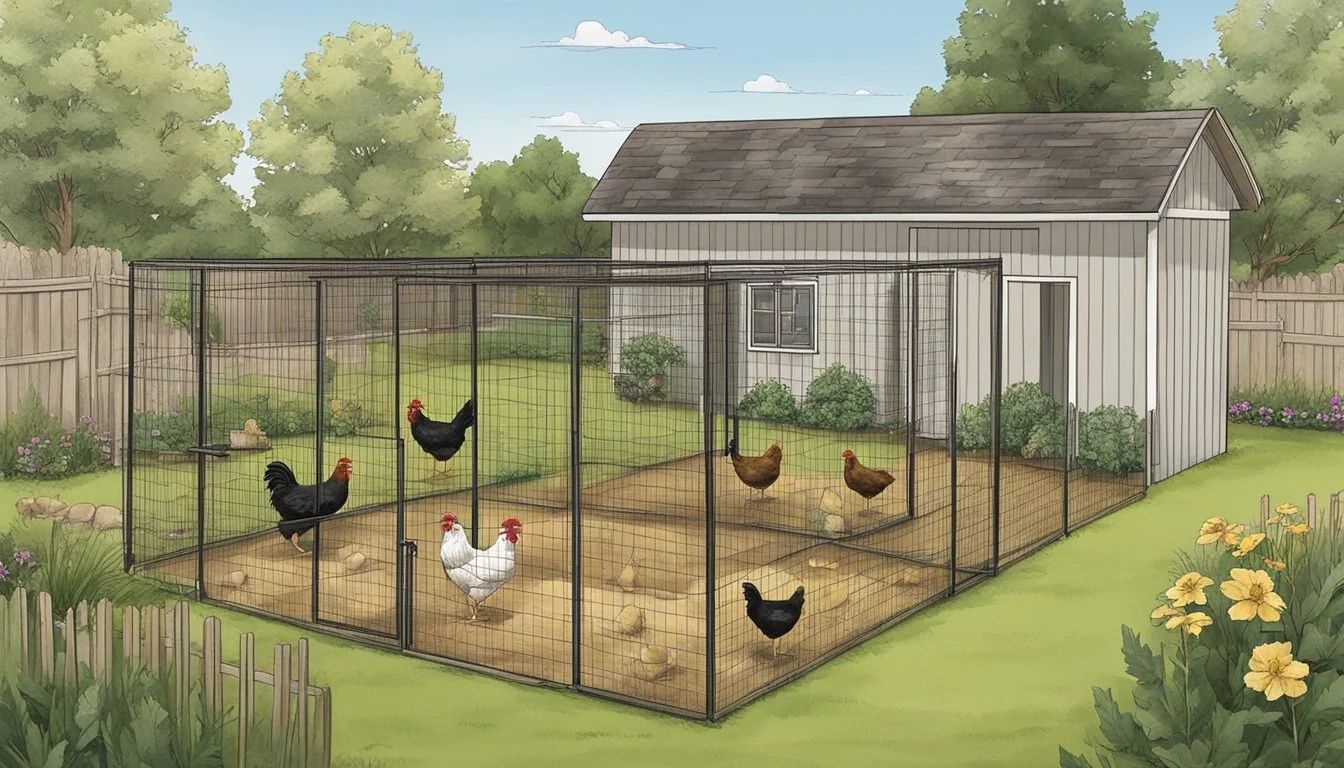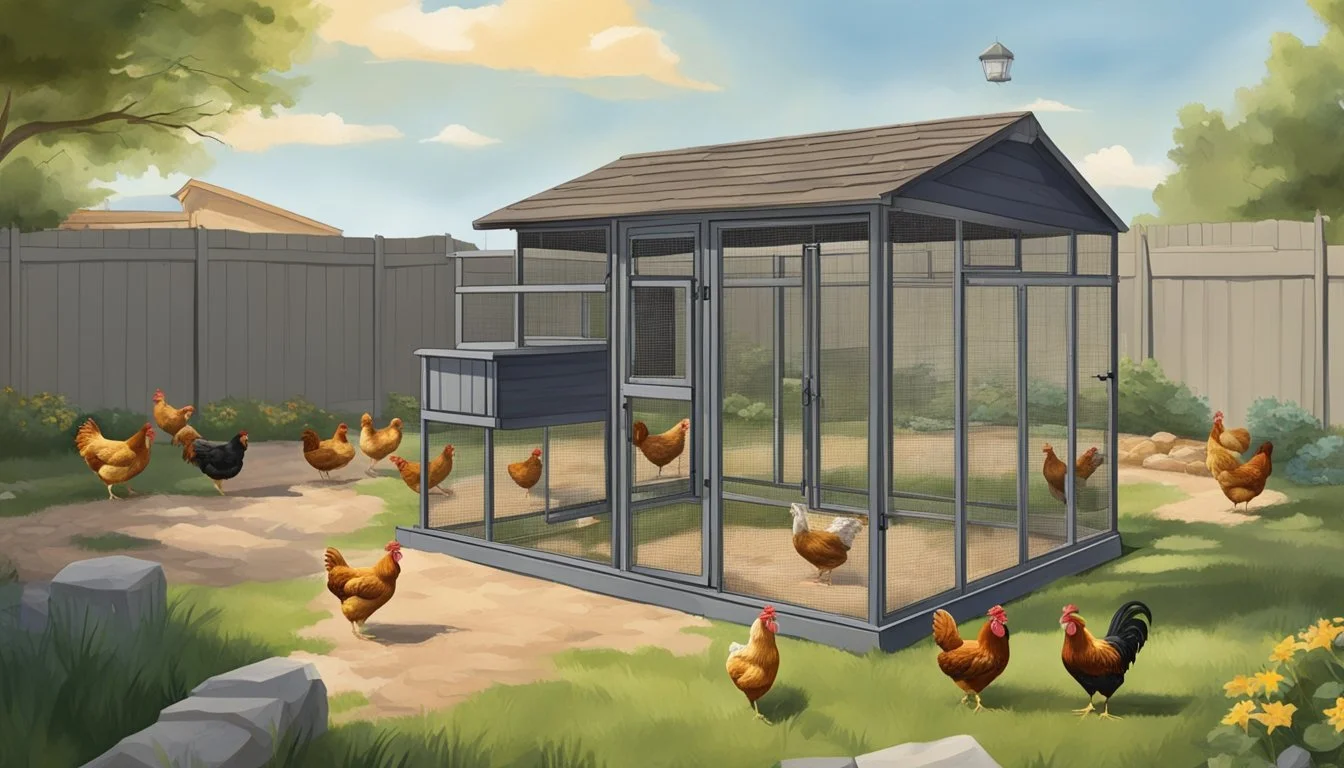Keeping Backyard Chickens in Thornton, CO
Essential Tips for Urban Poultry Farmers
Thornton, Colorado, offers residents the opportunity to engage in the rewarding activity of keeping backyard chickens. The local ordinance permits the rearing of these domestic birds, with a caveat that the endeavor requires compliance with specific regulations designed to maintain community health and safety standards. At the core of these regulations is the permit application process, an essential step for any Thornton resident looking to maintain a backyard flock.
Upon obtaining a permit, backyard chicken enthusiasts in Thornton must adhere to several guidelines to ensure their activities are in line with the city's expectations. These regulations encompass shelter requirements, such as coop size limitations and the necessity of keeping chickens within a properly fenced backyard to prevent escape. Additionally, any exchange of poultry products, including eggs and meat, must also conform to health and safety protocols established by the city.
Thornton’s approach to regulating backyard chickens illustrates a balance between allowing personal freedom in urban homesteading and safeguarding public health. This sets a standard for responsible animal husbandry that benefits both the residents and the community at large. The city's clear-cut rules are structured to facilitate a harmonious relationship between chicken keepers and their neighbors, ensuring that the practice remains sustainable and conflict-free.
Legal Framework for Backyard Chickens
Residents considering raising backyard chickens in Thornton, CO, must navigate a specific set of legal requirements that ensure compliance with local ordinances, zoning regulations, and permitting processes.
Understanding Thornton's Chicken Ordinance
In Thornton, the municipal code stipulates that individuals are permitted to keep backyard chickens under certain conditions. Most importantly, roosters are prohibited; only female chickens are allowed. The ordinance is designed to balance the interests of urban agriculture enthusiasts with the need to maintain public health and safety.
Zoning and Property Regulations
Zoning laws in Thornton dictate that chicken coops must be situated in the backyard only and must adhere to size constraints. The coops are restricted to:
A maximum of 120 square feet
A height no greater than 7 feet
Placement at least 5 feet from side and rear property lines
These regulations ensure that chickens are kept in an appropriate manner within residential areas and minimize potential issues with neighbors.
Permitting and Limits on Chicken Numbers
To keep backyard chickens legally, residents must obtain a permit. The process involves completing an application and the payment of a fee. While the search results did not specify the exact limit on the number of chickens allowed, typically municipalities have such limits to prevent overcrowding and to maintain sanitary conditions.
Holders of the permit must also comply with Colorado chicken ordinances and Thornton's specific requirements regarding the selling of eggs or meat, which are part of the broader regulations governing the possession of restricted livestock or fowl license.
Setting Up Your Chicken Coop
When establishing a chicken coop in Thornton, CO, residents need to consider local regulations on location, design, space, and safety to ensure a hospitable environment for their chickens.
Choosing the Right Location
Selecting an optimal site for a chicken coop involves several considerations. Firstly, the coop should be sited on high ground to prevent water accumulation and to ensure good drainage, thereby protecting the chickens from moisture-related issues. The location must also respect local zoning rules, such as not being placed directly on an abutting property line to maintain proper distance from neighbors.
Coop Design and Space Requirements
Designing a chicken coop requires adherence to both spatial efficiency and municipal regulations. A coop's size cannot exceed 120 square feet. Each chicken requires at least four square feet inside the coop and eight to ten square feet in an outdoor run. For example, a flock of six chickens would necessitate a coop of no less than 24 square feet and an adjoining run measuring between 48 to 60 square feet. The structure must be fully enclosed using materials like wood for shelter and include ample ventilation to keep the environment healthy and clean.
Security Against Predators
Securing chickens from predators is paramount. The chicken coop must be designed to be predator-proof. This involves robust materials and construction methods, including sturdy latches, reinforced wire mesh, and secure foundations to prevent predators from digging underneath. A fully enclosed run attached to the coop ensures chickens have a safe place to roam while being protected from aerial and ground predators.
Caring for Your Chickens
Keeping chickens in your backyard requires understanding their needs for a healthy and productive life. Proper diet, disease prevention, and coop maintenance are key factors.
Feeding and Nutrition
Chickens require a balanced diet to maintain their health and egg production. A quality commercial poultry feed offers a solid foundation, typically formulated with the necessary proteins, carbohydrates, vitamins, and minerals.
Daily Diet:
Starter feed for chicks, transitioning to grower feed, and eventually layer feed for laying hens.
Provide access to grit to help with digestion.
Supplements:
Offer calcium sources like oyster shells for hens to support eggshell quality.
Fresh greens, vegetables, and occasional fruits can be added as treats.
Water:
Fresh, clean water should be available at all times.
Waterers must be cleaned regularly to prevent the spread of disease.
Health and Disease Prevention
Monitoring the flock's health and taking preemptive actions can prevent the spread of disease.
Vaccination: Consult a veterinarian to determine appropriate vaccinations for common poultry diseases.
Parasite Control: Regularly check for external parasites like mites and lice, and follow recommended treatment plans.
Signs of Illness:
Monitor for abnormal behavior such as lethargy or changes in eating habits.
Isolate sick birds promptly to avoid infecting the flock.
Cleanliness and Maintenance
A clean environment is crucial to prevent disease and keep chickens comfortable.
Coop Cleaning:
The coop should be cleaned weekly, with manure and soiled bedding removed.
Perform a deep clean every few months, sanitizing the coop with a mild disinfectant.
Maintenance:
Ensure the coop is predator-proof with secure latches and hardware cloth.
Regularly inspect the coop for damage or potential hazards.
Ventilation:
Maintain good airflow to reduce moisture and ammonia levels, which can impact respiratory health.
By following these guidelines, backyard chicken keepers in Thornton, CO can ensure that their chickens remain healthy and thriving.
Other Considerations
When keeping backyard chickens in Thornton, CO, residents must be mindful of managing noise and nuisances, regulations surrounding egg production and sales, and proper practices for handling and slaughtering.
Managing Noise and Nuisances
Backyard chickens, especially roosters, can be a source of noise that may disturb neighbors. It is important to restrict the number of roosters or possibly avoid keeping them to minimize noise levels. Furthermore, chicken runs and coops should be well-maintained and kept clean to reduce odors and pests, thereby preventing nuisances.
Noise Control: Limit rooster ownership, if allowed, and ensure hens are kept quiet during early morning and evening hours.
Odor and Pests: Regular cleaning of the coop and proper waste disposal are crucial to prevent attracting rodents or causing offensive smells.
Egg Production and Selling
Regarding egg production, Thornton residents who wish to sell eggs must follow specific health and safety guidelines. Chickens must be kept in a fenced area to prevent them from wandering onto public roads and neighboring properties.
Selling Eggs: Compliance with local health and safety regulations is required, including proper labeling and handling.
Eggs Storage: Store eggs at appropriate temperatures to maintain freshness and prevent the spread of bacteria.
Handling and Slaughtering
When it comes to handling and slaughtering chickens, individuals must adhere to humane methods and sanitary conditions to ensure the health and safety of both the birds and the community.
Slaughtering Guidelines: Perform slaughtering in a humane, clean, and private space not visible from public areas.
Waste Disposal: Dispose of any remains after slaughtering in a manner that follows local regulations to avoid health risks and nuisances.
Community and Environment
When keeping backyard chickens in Thornton, CO, the community and the environment are two pivotal considerations. Municipal regulations dictate certain practices, but attention to neighborly relations and ecological impact is also of great importance.
Engaging with Neighbors and the Community
Within Thornton and surrounding municipalities such as Denver, Lakewood, Aurora, Arvada, Westminster, Centennial, Northglenn, Pueblo, and Fort Collins, engaging with neighbors and the broader community is crucial for harmonious living. Communication is key; residents should inform their neighbors about their intent to keep backyard chickens, addressing any potential concerns regarding noise, odor, or pests. In Thornton, chickens must be kept in the backyard only, and a coop is required, which must be placed at least five feet from side and rear property lines, ensuring a respectful distance from neighbors.
Community involvement extends to understanding fowl regulations within Thornton. As an example, only hens are allowed; roosters are prohibited to minimize noise disturbance. By adhering to such guidelines, residents demonstrate respect for their community and a commitment to local ordinances.
Environmental Impact and Sustainability
Backyard chickens contribute to a sustainable lifestyle, offering advantages such as natural fertilizer production and waste reduction. Chicken waste can be used to enrich the soil, reducing the need for synthetic fertilizers. However, proper management of waste is necessary to prevent any adverse effects on the environment, such as odor or attracting pests.
Sustainability efforts in Thornton are further supported by the limitation of coop size to 120 square feet and a height of seven feet, which ensures that the environmental footprint remains minimal. Coops must also be fully enclosed to protect the birds and mitigate any issues with free-roaming fowl that could disrupt local ecosystems. By focusing on sustainability and the provision of safe, contained environments for chickens, residents can ensure their presence enhances rather than harms the local environment.
Additional Livestock Considerations
When expanding a backyard flock or incorporating livestock, the specific regulations and compatibility with existing animals must be carefully considered.
Incorporating Other Fowl and Animals
Residents interested in adding other fowl such as ducks, geese, and turkeys to their backyard must ensure compatibility with their existing flock. Ducks and geese require access to water for swimming and may need more space than chickens. Concerning turkeys, they are generally larger and can require more food and space. It's important to note that male chickens, also known as roosters, are prohibited in the city of Thornton, which indicates breeding within the backyard flock is restricted. When introducing new birds or animals, one must consider the potential for disease transmission and ensure that all animals have adequate space, nutrition, and shelter.
Regulations Beyond Chickens
While the city of Thornton allows for the keeping of chickens, each additional species, whether fowl or other animals, may be subject to different sets of regulations. Owners must adhere to:
Health and safety regulations for all livestock.
Space requirements unique to each animal.
Protection against predators, which might involve fully enclosed spaces.
Waste management to maintain a sanitary environment.
Residents should consult the most recent guidelines from Thornton authorities for up-to-date regulations related to their entire backyard flock and associated livestock.







